In today’s interconnected world, the influence of global markets on local economies is more pronounced than ever. Whether it’s the price of oil, the demand for tech products, or the fluctuations in the stock market, global trends shape our daily lives. This intricate relationship can be likened to a tapestry where each thread, representing different economies, is interwoven to create a complex yet beautiful picture.
Understanding Global Markets
Global markets encompass the international exchange of goods, services, and capital. These markets include stock exchanges, commodities, and currency trading platforms. When we talk about the global market, we’re referring to the sum of all economic activities that happen across different countries.
For instance, consider the New York Stock Exchange (NYSE) (a global leader in stock trading) or the Shanghai Stock Exchange (a major player in Asia). These exchanges influence global finance and subsequently affect local economies worldwide.

The Ripple Effect on Local Economies
The impact of global markets on local economies can be significant. Let’s break down some key areas:
1. Trade and Exports
When global demand for certain products rises, countries that export these products benefit. For example, India is a major exporter of textiles and software services. An increase in global demand for these can lead to higher revenue for Indian businesses and more job opportunities locally.
2. Currency Fluctuations
Currency values fluctuate based on global economic conditions. For instance, if the Indian Rupee (INR) weakens against the US Dollar (USD), it can make Indian goods cheaper for foreign buyers, boosting exports. However, it can also make imports more expensive, affecting local prices of goods such as electronics and fuel.
3. Foreign Investments
Foreign Direct Investment (FDI) is crucial for local economies. When global companies invest in Indian infrastructure or startups, it brings in capital, technology, and expertise. Companies like Google (a global tech giant) and Amazon (an international e-commerce leader) have invested heavily in India, creating jobs and fostering innovation.
4. Commodity Prices
Global markets determine the prices of crucial commodities such as oil, gold, and agricultural products. For instance, if oil prices surge globally, it directly impacts fuel prices in India, affecting everything from transportation costs to the price of goods in markets.
Challenges and Opportunities
While global markets offer numerous opportunities, they also present challenges. The interconnected nature of these markets means that a financial crisis in one part of the world can quickly spread to others. The 2008 financial crisis, which started in the United States, had far-reaching impacts on economies globally, including India.
1. Economic Vulnerability
Local economies become vulnerable to global market fluctuations. This vulnerability means that any negative global trend, such as a recession, can lead to job losses, inflation, and economic instability at home.
2. Competition and Innovation
On the flip side, exposure to global markets encourages local businesses to innovate and improve their competitiveness. Indian companies that engage in international trade often adopt better practices and technologies, enhancing their productivity and quality.
The Role of Policy
Government policies play a crucial role in managing the impact of global markets on local economies. By enacting favorable trade policies, promoting foreign investment, and safeguarding local industries, governments can mitigate negative effects while maximizing benefits.
For instance, India’s ‘Make in India’ initiative aims to encourage companies to manufacture in India and incentivize dedicated investments into manufacturing. This policy helps boost the local economy by creating jobs and fostering industrial growth.

Conclusion
The tapestry of global markets and their impact on local economies is a complex yet fascinating subject. For India, navigating this intricate web involves leveraging opportunities while safeguarding against potential risks. By understanding and adapting to these dynamics, local economies can thrive in a globally connected world.
Author’s Note
As we delve deeper into the global markets and their influence on local economies, it’s clear that staying informed and adaptable is key to navigating these changes. The insights shared here aim to provide a better understanding of how interconnected our world truly is and the importance of strategic economic policies.
G.C., Ecosociosphere contributor.




